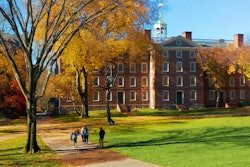As Detroit rallies to reverse a prolonged economic downturn, its multi-pronged revitalization campaign now includes Wayne State University’s Detroit Revitalization Fellowship, a two-year executive certification program that has attracted twice its projected tally of applicants.
The 25 fellows, slated to be announced in July, are being plucked from a nationwide pool of 640 mid-career urban planners, public policymakers, lawyers, architects, community organizers and developers and others, with Detroit natives especially targeted for the fellowship.
“The surprising part is that they were not just applicants looking for jobs. A lot of them are currently employed; they’re serious contenders. That speaks to the value of the program and what’s happening in the city,” said Dr. Ahmad Ezzedine, Wayne State’s associate vice president for educational outreach and international programs. “We’re an urban research university. For years, we’ve been a major player … on economic development, education and health care. This is just another venue for doing some of the same kind of work.”
While employed at private firms, government agencies and nonprofit organizations, the fellows also will be immersed in academic case studies, on-campus courses, seminars led by an array of practitioners in urban development and key players from Detroit’s network of economic and community developers. In addition, they will excavate such issues as how to tap into the “social capital” and talents of blighted neighborhoods and the impact of race, gender and class on redevelopment.
“The Detroit Revitalization Fellows program is an opportunity for our organization to help grow a new generation of leaders that will be part of Detroit’s transformation,” said David Blaszkiewicz, president of Invest Detroit and chief executive officer of Downtown Detroit Partnership. “Participating in the program also helps us to increase our capacity to create a vibrant, sustainable future for Downtown Detroit by allowing us to add a creative, flexible, skilled and talented person to our staff.”
Co-sponsored with the Kresge and Hudson-Webber Foundations, Wayne State’s project is modeled after the University of Pennsylvania’s 2009 CureX Fellowship, whose key partner was the Rockefeller Foundation. Of the 25 fellows in CureX’s bid to resurrect New Orleans, post-Hurricane Katrina, 23 are still working in that Louisiana city. Most are at their original work sites.
“We’re all urban revitalization geeks, if you will,” said attorney John T. Marshall, a CureX alum, and legal counsel for the New Orleans Development Authority. “We see possibility and opportunity and beauty in neighborhoods, in cities. Just as a physician wants to make his patient better, we want cities to work better. That’s what gets us out of bed in the morning.”
He traded 10 years at a national law firm, based in Tampa, Fla., to be part of New Orleans’ fight for a comeback, believing its commerce, culture, regional and national history were equally important to the port city’s future.
The fellows, Marshall said, remain a part of a fairly close-knit collaborative. “Part of our strength has been in understanding the different viewpoints we have as a [diverse] group. In the city of New Orleans, there are just as many viewpoints that flow from race, ethnicity and sex,” he said, and those factor heavily into redevelopment.
He cited the practical merits of fellowships like that of Penn and Wayne State: “To face the complex problems of declining cities, arming yourself with a single degree, in isolation—economics, law, urban planning—is not sufficient. You really need a multidisciplinary approach to problem-solving. [CureX] gave us a common vocabulary and common methods for addressing urban problems.”
Wayne State’s fellowship aims for the same kind of convergence, Ezzedine said.
“We’re going through a major transformation, recovering from the economic crisis, the impact that the [troubled] auto industry has had on the city and the state,” Ezzedine said. “We’re trying to bring in new industries and look into new ways to redevelop the city and its neighborhoods. It requires everybody to think of new ways to revitalize the city.”
He continued: “The energy and the initiatives and the projects that are happening here can certainly be a model for other places. We have been hit harder than other cities. If we can turn around, others can do the same. That’s what we’re hoping we can show the country.”


















